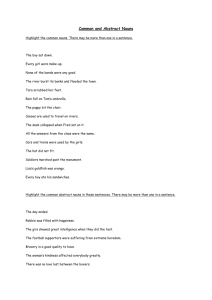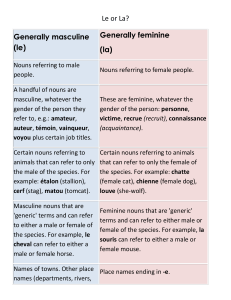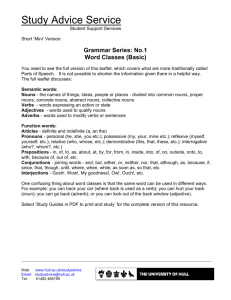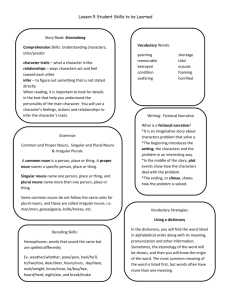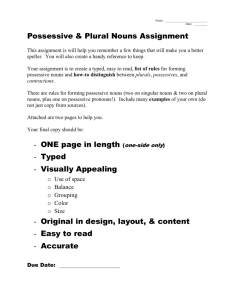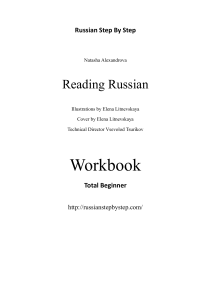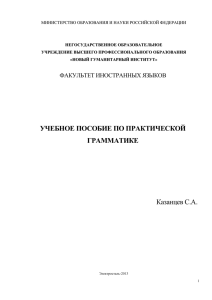PERSONAL PRONOUNS
advertisement
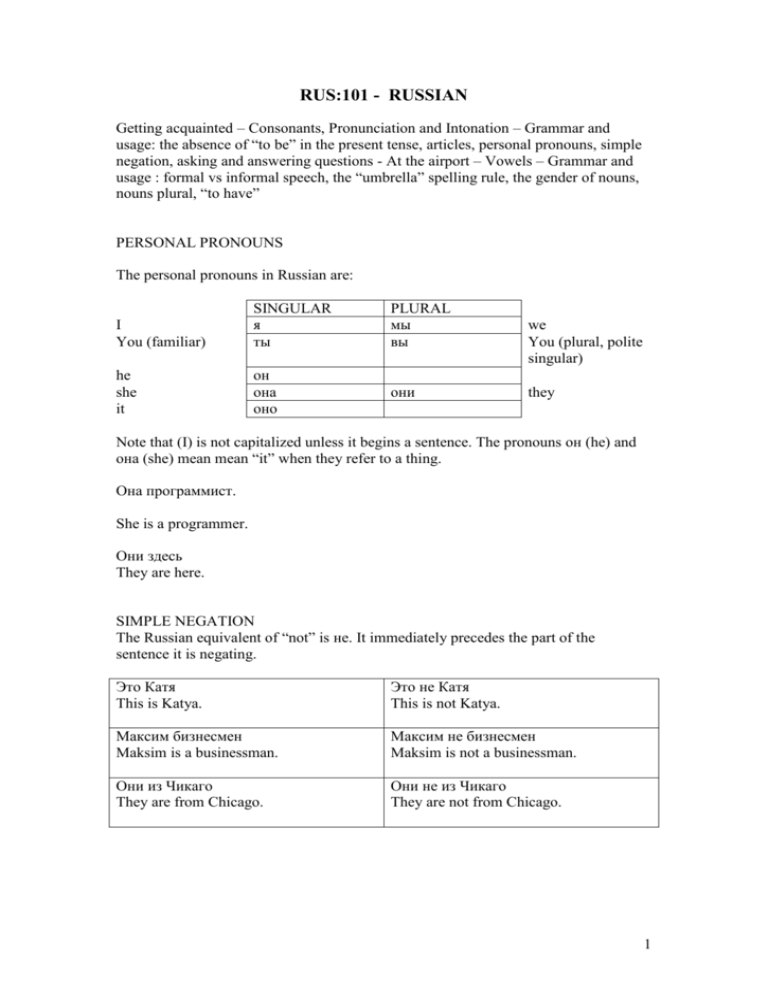
RUS:101 - RUSSIAN Getting acquainted – Consonants, Pronunciation and Intonation – Grammar and usage: the absence of “to be” in the present tense, articles, personal pronouns, simple negation, asking and answering questions - At the airport – Vowels – Grammar and usage : formal vs informal speech, the “umbrella” spelling rule, the gender of nouns, nouns plural, “to have” PERSONAL PRONOUNS The personal pronouns in Russian are: I You (familiar) SINGULAR я ты PLURAL мы вы he she it он она оно они we You (plural, polite singular) they Note that (I) is not capitalized unless it begins a sentence. The pronouns он (he) and она (she) mean mean “it” when they refer to a thing. Она программист. She is a programmer. Они здесь They are here. SIMPLE NEGATION The Russian equivalent of “not” is не. It immediately precedes the part of the sentence it is negating. Это Катя This is Katya. Это не Катя This is not Katya. Максим бизнесмен Maksim is a businessman. Максим не бизнесмен Maksim is not a businessman. Они из Чикаго They are from Chicago. Они не из Чикаго They are not from Chicago. 1 ASKING AND ANSWERING QUESTIONS English yes/no questions and Russian да/нет questions are similar. Answers with да often omit the subject and consist only of the word that was questioned, while answers with нет generally repeat the subject. Is Eleanor a tourist? – Yes, she is./ No, she’s a programmer. Is this Katya? – Yes, it is./ No, it’s Anya. Two useful question words in Russian are кто (who), and что(what). You can respond to both using это (this/that is). Use the intonation pattern when asking questions beginning with кто or что. Кто это? - Это Элеонора Джонсон. Who is this? – This is Eleanor Johnson. Кто это? - Это я. Who is it? – It’s me. FORMAL VERSUS INFORMAL SPEECH Once you’ve determined whether you should address someone as вы or ты, you must use the appropriate formal or informal forms for greeting, parting, or asking questions. Hello! Hi! What is your name? How are you? How are things? Where do you live? Do you have…? Nice to meet you. Goodbye! See you! PLURAL OR FORMAL (WITH) Здравствуйте! Как вас зовут? Как вы поживаете? Как ваши дела? Где вы живёте? У вас есть…? Очень приятно (познакомиться с вами) До свидания! INFORMAL (WITH) Здравствуй! Привет! Как тебя зовут? Как ты? Как дела? Где ты живёшь? У тебя есть…? Очень приятно. Пока! Счастливо! THE “UMBRELLA” SPELLING RULE This three-part rule will be invaluable to you when learning the grammatical endings of Russian words. RULE 1. The vowels ы, ю, and я change to и, у, and а, respectively, after ж, к, г, х, ч, ш, or щ. жить русский хата чудо ищу книга Маша 2 to live Russian hut miracle (I) look for book Masha RULE 2. ю and я change to у and а respectively after ц. отца father’s отцу To the father отцы fathers цирк circus RULE 3. Unstressed о changes to е after ж, ц, ч, ш, or щ. с мужем яйцо с ключом большое пишущее with the husband egg With a key big writing This rule is especially useful to remember when forming noun plurals or adding endings of any kind. THE GENDER OF NOUNS Every noun in Russian has grammatical gender, regardless of whether it refers to a person, animal, object, or abstract concept. Russian nouns can be feminine, masculine, or neuter. Feminine nouns usually end in –а or -я. выставка exhibit декларация declaration книга book ручка pen Таможня customs Masculine nouns usually end in a consonant. This is commonly referred to as having a zero-ending. Факс модем fax-modem принтер printer бизнесмен businessman турист tourist урок lesson Some common words denoting a male person do not follow the usual pattern, in that they have feminine endings yet are still considered masculine nouns. мужчина man дядя uncle дедушка grandfather Миша Misha Nouns ending in –ь can be either masculine or feminine and must be learned on a case-by-case basis. Nouns ending in a husher sound (ж, ш, щ, у) and –ь can be only feminine. Masculine: день day портфель briefcase Feminine: вещь thing тетрадь notebook Neuter nouns usually end in –о or –е. However, most foreign nouns are considered neuter, so this group also includes some cognates that end in –и or another vowel. утро радио упражнение такси произношение 3 morning radio exercise taxi pronunciation Note that some grammatically masculine nouns can refer to people of either gender, especially with traditionally male professions. доктор doctor профессор professor программист programmer строитель construction worker учёный scientist 4


